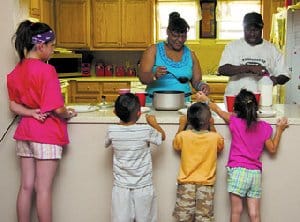With more than 400,000 children in foster care in the United States, it's an issue that's not going away.
Foster care is a temporary living arrangement for children who have been taken from their families as a result of abuse, neglect or their parents' inability to care for them. It is designed for the short-term care of a child until a permanent living arrangement is made through reunification with the family, transfer of guardianship or, in some cases, adoption. Some children remain in the foster care system long-term, until they are emancipated at age 18.
But foster care is much more than that.
"As Christians, we're called to answer the needs of the vulnerable," said Samela Macon, foster care program director for Buckner Children and Family Services in Beaumont. "And families that are the most successful with foster care think of it as God's calling on their lives."
In many conversations, foster care is talked about as a way to do social justice. In the church, it's also about ministering to the broken-hearted.

Hishia and Rickey Conner have cared for more than 70 children in the past five years at Buckner Children's Home in Lubbock– sometimes up to 12 children at once. "Faith has brought us here and kept us here," she said.
|
"So many of the kids we serve have never been to church and don't know the beauty of who they are as God's creation," Macon said. "The way they see themselves is wrapped up in how their abusers made them feel. Our families, as Christian families, offer these children an opportunity to see themselves through new eyes as the beautiful workmanship of God."
In that view, foster families have opportunities to make a huge impact on a child's life—an eternal impact, even. But like any other ministry, foster care is a calling, and families must be mindful of that before diving in.
"Foster care is hard work, and it's extremely stressful," said Sunny Ashabranner, foster care supervisor for STARRY, a program of Children at Heart Ministries in Round Rock. "We really want to make sure every family who is interested in pursuing foster care and adoption really feels led to do it."
Things to consider
Education, education and more education are essential when considering foster care.
"People have a lot of assumptions about what the process of certification is like, and they often shy away before they have all the information," Macon said. "We offer education to families about how the system works, the dynamics of abuse and neglect and the effects it has on children.
"You have to make sure you're making informed decisions all along the way. And you need to work with an agency you can trust to make good decisions as well. Families who have young children of their own have to think about how they're going to ensure the safety of their kids."
It's especially important for families with biological children to talk with their kids before making any decisions, Ashabranner said.
"It's easy to look at foster parents' sacrifices and overlook how the lives of their biological children drastically change," she said. "They sometimes give up their rooms, their toys or time with parents. They may not understand why so many visitors come over for the foster child or why the foster child's discipline looks different from that of the biological child
"I would definitely encourage families to have really open conversations about what they're doing and what they see for their family before ever pursuing foster care in an active way."
It takes a village
Families that confirm their calling to foster need support and lots of it.
"Our churches take a lot of pride in their foster families," said Robbi Haynes, director of recruitment and marketing for Missouri Baptist Children's Home. "They make a point to let the rest of the church know what their foster families are doing so that the church body can be supportive."
Churches can help by collecting donations of necessities like clothes or diapers. NorthBridge Church in Springfield, Mo., has provided Christmas gifts for its foster families the last two years. This year, they started a drive to collect backpacks filled with school supplies for foster children in their church and in the Missouri Baptist Children's Home.
"It's just one of those things that God put on our radar," said Pastor Michael Graves at NorthBridge. "There were folks with a passion for foster kids already in the congregation, so it was a natural fit."
Churches also can open their facilities to host informational and training classes or start support groups for foster families and provide childcare when the groups meet.
There are plenty of things individuals and nonfostering families can do to support the ministry of foster families they know, too.
"Families need babysitters and respite providers," Ashabranner said. "That in itself is such a huge support. And it's even better when it's someone you know—especially someone from church that the child sees weekly, because then there's no adjustment for the child."
People also can volunteer to provide "extras" for foster children in their congregation—things the fostering stipend doesn't cover.
"Foster parents barely break even," Haynes said. "The stipend they receive will pay for new clothes once a year and food, but not any kind of extras. It's wonderful when people can help provide those things, like haircuts, birthday presents, prom dresses, football cleats, piano lessons, entry to a basketball game. … There are lots of things the state doesn't provide for that really help kids to develop."
For more information on foster care, visit:
•www.childrenatheartministries.org
